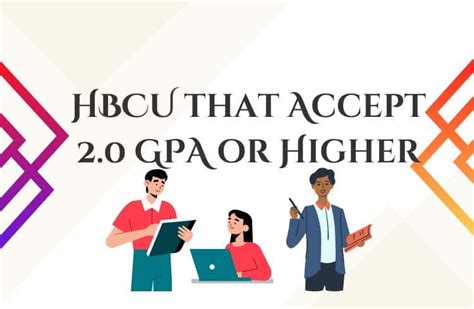In the pursuit of higher education, students with GPAs below the traditional cutoff often face limited options. However, in recent years, there has been a growing trend among historically black colleges and universities (HBCUs) to accept students with lower GPAs, opening doors to a wider range of aspiring scholars.

Overview of GPA Requirements at HBCUs
According to the National Center for Education Statistics (NCES), the average GPA for first-time college students enrolling in HBCUs is 2.9. However, many HBCUs have established special programs and admissions criteria to accommodate students with lower GPAs. These programs typically require additional documentation, such as standardized test scores or letters of recommendation, to demonstrate a student’s potential for success in college.
List of HBCUs That Accept 2.0 GPAs
The following is a non-exhaustive list of HBCUs that accept GPAs of 2.0 or higher:
| Institution | GPA Requirement |
|---|---|
| Alabama A&M University | 2.0 |
| Alcorn State University | 2.0 |
| Bethune-Cookman University | 2.0 |
| Delaware State University | 2.0 |
| Edward Waters College | 2.0 |
| Fort Valley State University | 2.0 |
| Jackson State University | 2.0 |
| Langston University | 2.0 |
| Livingstone College | 2.0 |
| Norfolk State University | 2.0 |
| North Carolina Agricultural and Technical State University | 2.0 |
| Prairie View A&M University | 2.0 |
| South Carolina State University | 2.0 |
| Southern University and A&M College | 2.0 |
| Tennessee State University | 2.0 |
| Tougaloo College | 2.0 |
| Tuskegee University | 2.0 |
| Virginia State University | 2.0 |
Admission Procedures for Students with Low GPAs
While HBCUs may accept students with GPAs as low as 2.0, the admission process typically involves additional steps for those with lower GPAs. Prospective students may be required to:
- Submit standardized test scores (SAT or ACT)
- Provide letters of recommendation from teachers or counselors
- Write a personal statement or essay
- Participate in a college readiness program
Benefits of Attending an HBCU
HBCUs offer a unique and supportive environment for students, particularly those from underrepresented backgrounds. Some of the benefits of attending an HBCU include:
- Increased representation and sense of belonging
- Culturally relevant curriculum and support systems
- Mentoring and guidance from faculty and staff
- Strong alumni networks and career placement resources
Tips and Tricks for Students with Low GPAs
- Take advantage of college readiness programs: Many HBCUs offer bridge programs or summer bridge programs designed to prepare students with low GPAs for the rigors of college coursework.
- Build a strong academic portfolio: Supplement your GPA with extracurricular activities, volunteer work, or internships that demonstrate your academic potential and commitment to learning.
- Get involved in campus life: Participate in clubs, organizations, or sports teams to showcase your leadership skills and social engagement.
- Seek support from mentors and advisors: Reach out to professors, counselors, or other mentors who can provide guidance and support throughout your college journey.
Common Mistakes to Avoid
- Don’t give up: Even with a low GPA, it is possible to achieve your educational goals. Explore alternative pathways, such as community college or bridge programs, to build a stronger academic foundation.
- Don’t be discouraged by rejections: If you don’t get accepted to your first-choice HBCU, don’t despair. Apply to multiple institutions and consider all your options.
- Don’t settle for less: While HBCUs that accept low GPAs provide opportunities for higher education, it is important to set high standards for yourself and strive for academic excellence.
FAQs
Q: What are the admission criteria for HBCUs that accept 2.0 GPAs?
A: In addition to a GPA of 2.0 or higher, students may need to provide standardized test scores, letters of recommendation, and other documentation.
Q: Are there any financial aid options available for students with low GPAs?
A: Yes, many HBCUs offer financial aid programs, such as scholarships, grants, and work-study, to help students with lower GPAs afford college.
Q: What can students do to improve their chances of admission to an HBCU with a low GPA?
A: Students can improve their chances of admission by building a strong academic portfolio, getting involved in campus life, and seeking support from mentors and advisors.
Q: Is it possible to transfer to a more prestigious university after attending an HBCU with a low GPA?
A: Yes, it is possible to transfer to a more prestigious university after attending an HBCU with a low GPA by demonstrating academic excellence and building a strong academic record.
